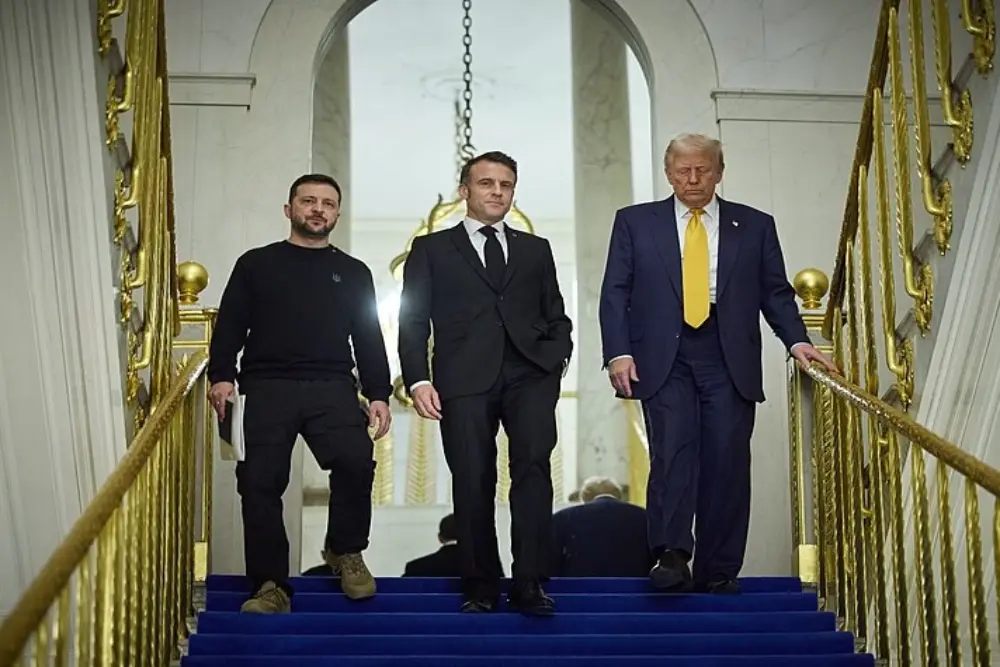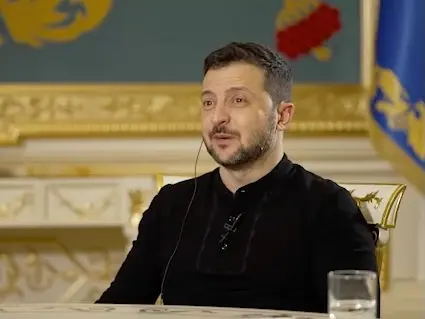Three weeks after his installation in the White House, President Trump is trying to resolve the Ukrainian conflict. It is clear that his advisors are blinded by their prejudices and do not understand any of Moscow’s concerns. They give him a false image of Russia’s involvement in this conflict. Realizing that it is impossible for him to move forward, Donald Trump therefore turns to economic transactions, as he did for Gaza. This time, he proposes to exploit Ukrainian rare earths.

resident Donald Trump had announced that he would resolve the Ukraine conflict in a matter of days, then acknowledged that it would probably take several weeks. He appointed General Keith Kellogg as special envoy to Ukraine. The latter succeeded General Michael Flynn as national security adviser then served as the chief of staff of the National Security Council, during Trump’s first term.
During the election campaign, Kellogg had asked one of his former collaborators, Frederic H. Fleitz, to prepare a plan for Ukraine. It was published on April 11, 2024, by the America First Policy Institute [1]
This text is first a praise of candidate Trump and a criticism of President Biden (then a candidate for re-election), but it also includes many ideas.
• First, the two men consider as “ridiculous” the Russian claims that the special military operation aims to denazify Ukraine. Similarly, they consider Russia’s fear of Ukraine joining NATO as “paranoia.” They interpret the Biden administration’s failure by accusing it of unnecessarily playing against Russia by supporting Kiev’s bid for NATO membership instead of directly negotiating it with Moscow. Finally, they consider that President Biden’s policy of not directly supporting the Ukrainian military, but mobilizing his allies to do so for him, was a serious mistake because it caused the United States to lose control of the situation.
• Regarding the peace negotiations, the authors do not rule out that the Biden administration pressured British Prime Minister Boris Johnson to convince Ukrainian President Volodymyr Zelensky to derail them. They note that in April 2023, the Biden administration divorced itself from the Washington establishment after doing so with European leaders: Richard Haass, president of the Council on Foreign Relations, and Charles Kupchan, a professor at Georgetown University, published an article in Foreign Affairs, noting that the West was failing to win and therefore had to negotiate peace; a view that was echoed by Henry Kissinger himself. The Hass-Kupchan plan provided that Ukraine would not give up its lost territories, but would commit to recovering them through diplomacy, not force, in exchange for which the United States would ease its sanctions against Russia.
What is astonishing about the reasoning of the America First Policy Institute is that it completely ignores the Russian point of view and projects Washington’s way of thinking onto Moscow. It does not attach any importance to the Nazification of Ukraine, not because the US is unaware of it, but because the United States would not wage a war for an ideological question [2]. Similarly, it ignores the Russian fear of foreign weapons being installed on its borders, interpreting it as a NATO phobia when it is a question of defending the longest borders in the world. As a result, it absolutely does not understand why Moscow believed it was preventing war by presenting a proposal for a treaty on security guarantees to Washington on December 17, 2021 [3]. We must therefore conclude that in April 2023, the Trump team did not understand anything about Russia’s involvement in Ukraine and therefore could not put an end to this war.
The incomprehension of Donald Trump’s advisers on the Ukrainian question has been reaffirmed many times. Thus, on July 25, 2023, in The Federalist [4], Frédéric H. Fleitz expressed surprise that the NATO summit in Vilnius did not set a date for Ukraine’s accession and postponed it as if out of fear of Russia. He interpreted Moscow’s position as believing that it imagines that Ukraine is falling outside its zone of influence and because it fears that a democratization of this country will spread to its own territory.
For its part, the Kremlin, which is in a position of strength, has announced that it will not agree to discussions until Ukraine publicly renounces the territories it has lost and publicly declares that it will not join NATO, but commits to being neutral. Russian President Vladimir Putin has specified that Russia will only be able to sign a peace treaty when Ukraine has a legitimate leader to do so. However, President Zelensky’s elective mandate ended in May 2024. Having declared a state of siege since the beginning of the war, no elections have been held. He has not attempted to lift the state of siege to organize his succession. According to the Ukrainian Constitution, it is not up to him to ensure the interim, but to the speaker of the Verkhovna Rada (National Assembly), Ruslan Stefanchuk. Aware of his illegitimacy, the unelected President Zelensky often has Stefanchuk accompany him on his trips abroad.
The 11 Ukrainian opposition political parties were banned on the grounds that they advocated surrender on enemy terms. In practice, they demanded that monuments to the Organization of Ukrainian Nationalists (OUN-B), i.e. Nazi collaborators, be destroyed. On the contrary, the current regime has erected others and supports the original myth that the great famine (Holodomor) was attributable to the murderous will of the Russians, which is obviously stupid, since this famine ravaged other regions of the USSR [5]. This myth has been endorsed, one by one, by almost all the national assemblies of Western democracies.
With President Donald Trump in the White House, there has been a growing awareness of this incongruity in the United States: Ukraine has banned opposition political parties, the main Christian church, and burned millions of books by Russian authors or published by Russian printers. General Keith Kellogg says: “In most democracies, elections are held even in times of war. I think that’s important. I think it’s good for democracy. The beauty of a strong democracy is to have more than one potential candidate.”
The CIA seems to be choosing to favor the election of Oleksiy Arestovytch, Volodymyr Zelensky’s former communications adviser. He is a less skilled man than Zelensky, but much more intelligent, a specialist, among other things, in mass manipulation.
However, on February 2, two days before the opening of direct contacts between the White House and the Kremlin, the SVR (Russian Foreign Intelligence Service) released a strange press release [6]. Noting that the United States is considering getting rid of Volodymyr Zelensky, it reveals that NATO, which is trying to preserve what remains of Ukraine in order to maintain a bridgehead against Russia, is preparing to block his possible re-election. To this end, the Atlantic Alliance plans to release three pieces of news:
• 1.5 billion euros intended for the purchase of munitions has been embezzled by the Ukrainian presidency;
• 130,000 Ukrainian soldiers, killed in combat, continue to receive their salaries;
• the unelected President Zelensky has transferred — and not sold — real estate to foreign companies and compensation has been discreetly paid to him in foreign accounts.
The SVR statement should be taken with a pinch of salt, since it had already announced last June [7] that Washington wanted to get rid of Zelensky. But at the time, it was still the Biden administration that was in the White House.
This Western “preparation” and the start of official negotiations between the White House and the Kremlin on February 5 gave rise to a strange proposal from President Trump on February 7: the United States would provide financial aid in exchange for authorization to exploit Ukrainian rare earths.

Without waiting, the unelected Ukrainian president gives an interview to the Reuters agency [8] and broadcasts excerpts on his Telegram channel before its publication. He declares: “Ukraine is a very rich land. This does not mean that we give it to anyone, even to strategic partners. We are talking about partnership… Let’s develop this together, let’s make money, and above all, it’s about the security of the Western world (…) It’s very interesting for us, I know it’s very interesting for the Trump administration (…) We are ready and willing to have contracts for the supply of liquefied natural gas (LNG) to Ukraine. And of course, we will be a hub for the whole of Europe (…) The Americans have helped the most, and therefore they are the ones who should gain the most. They should have this priority, and they will benefit from it. I would also like to discuss this with President Trump.
The problem is that Russia already occupies a large lithium deposit in the Donetsk region (East), after having taken another deposit in Krouta Balka in the Zaporizhzhia region (South); two regions that requested by referendum and obtained their attachment to the Russian Federation. It is therefore urgent: soon Ukraine will have nothing left to offer.
[1] America First, Russia and Ukraine, Keith Kellogg & Frédéric H. Fleitz, America First Policy Institute, April 11, 2024.
[2] “Who are the Ukrainian integral nationalists ?”, by Thierry Meyssan, Translation Roger Lagassé, Voltaire Network, 15 November 2022.
[3] “Russia wants to force the US to respect the UN Charter”, by Thierry Meyssan, Translation Roger Lagassé, Voltaire Network, 4 January 2022.
[4] «How Promising NATO Membership To Ukraine Could Lead To World War III», Frédéric H. Fleitz, The Federalist, July 25, 2023.
[5] Selon l’article 85, alinéa 5 de la Constitution : «La Verkhovna Rada détermine la politique intérieure et extérieure et met en œuvre l’orientation stratégique de l’État en vue de la pleine adhésion de l’Ukraine à l’Union européenne et à l’Organisation du Traité de l’Atlantique Nord»
[6] « L’Holodomor, nouvel avatar de l’anticommunisme “européen” » (extrait de Le Choix de la défaite), Annie Lacroix-Riz (2010). Famine et transformation agricole en URSS, Mark Tauger, Delga (2017).
[7] «Натовцы готовят кампанию по дискредитации В. Зеленского», Пресс-бюро СВР России, 3 Февраля 2025.
[8] «Quotes from President Volodymyr Zelenskiy’s interview with Reuters», Reuters, February 7, 2025.
Source: Voltaire Network










Comments